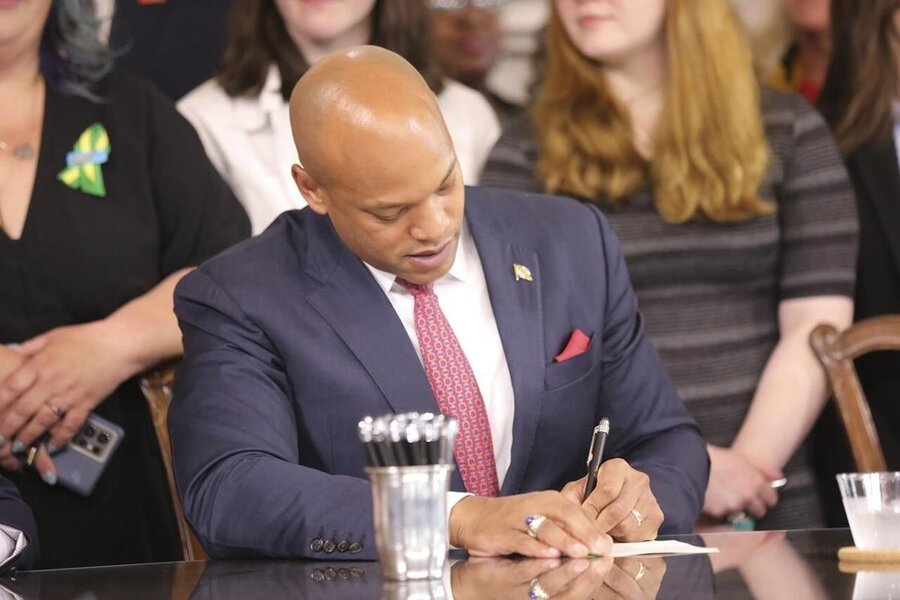Maryland Governor Wes Moore, a Democrat, is set to pardon more than 175,000 marijuana convictions on Monday, calling it the most extensive and proactive executive action to address the consequences of the war on drugs.
Governor Wes Moore, who took office in 2023 after former Governor Larry Hogan (R) reached his term limit, announced that around 100,000 individuals would be affected by the pardons, as reported by the Washington Post.
“I’m ecstatic that we have a real opportunity with what I’m signing to right a lot of historical wrongs,” he told the publication.
“If you want to be able to create inclusive economic growth, it means you have to start removing these barriers that continue to disproportionately sit on communities of color,” he added.
A 2022 report on racial equity by state analysts showed that while white Maryland residents use cannabis at a higher rate than black Maryland residents, black residents were more than twice as likely to be charged with possession.
Maryland residents voted in a referendum to legalize marijuana for adult use in November 2022, which went into effect when Moore signed the bill on May 3, 2023.
Despite Maryland becoming the first state in the Washington, DC, area to fully legalize the sale of marijuana — although DC and Virginia have decriminalized it — Maryland residents who have been convicted of low-level possession crimes in the past still have those convictions on their records.
Derek Liggins, 57, who is among those being pardoned, was released from prison over 16 years ago after being convicted of possessing and dealing the drug in the late 1990s.
Though he’s been a free man for well over a decade, his past has still followed him around and hindered job opportunities. While he’s held a steady job at a Baltimore HVAC construction company for many years, Liggins is barred from working on the highest-paying contracts with the federal government because of his marijuana crimes.
“You can’t hold people accountable for possession of marijuana when you’ve got a dispensary on almost every corner,” he told the Post.
He applauded the governor’s effort to help open more doors for people like him.
“A person can change,” Liggins explained. “A person should be able to pay their debt to society and start fresh.”
Maryland Attorney General Anthony G. Brown (D) said the pardons are “certainly long overdue as a nation,” and called them “a racial equity issue.”
“While the pardons will extend to anyone and everyone with a misdemeanor conviction for the possession of marijuana or paraphernalia, this unequivocally, without any doubt or reservation, disproportionately impacts — in a good way — Black and Brown Marylanders,” the attorney general told the Post.
“We are arrested and convicted at higher rates for possession and use of marijuana when the rate at which we used it was no different than any other category of people,” he added.
Moore referred to the mass pardons as “the most far-reaching and aggressive” by executive officials nationwide who are trying to right what are often seen as wrongs committed by the war on marijuana.
In March, Gov. Maura Healy (D-MA) also issued a blanket pardon that impacted hundreds of thousands of people, USA Today reported.
“We’re taking actions that are intentional that are sweeping and unapologetic,” Moore said at a Monday morning news conference, according to USA Today.
“But there’s a reason that we’re being so intentional today. Policymaking is powerful. And if you look at the past, you see how policies have been intentionally deployed to hold back entire communities,” he claimed.
The pardoning will automatically forgive any misdemeanor marijuana possession and paraphernalia charge in Maryland’s electronic court records system, according to the Post. However, individuals with older cannabis convictions from the 80s and 90s can also apply to have their paper records pardoned.
The electronic records in some Maryland jurisdictions date back to the 1980s, while others begin in the 1990s or later.
WATCH:
This morning, I sign an executive order pardoning 175,000 convictions related to the possession of cannabis and certain convictions for misdemeanor possession of drug paraphernalia. https://t.co/GWQhepn6DZ
— Governor Wes Moore (@GovWesMoore) June 17, 2024
Share your thoughts by scrolling down to leave a comment.













